
A subordinate clause will begin with a subordinate conjunction or a relative pronoun and will contain both a subject and a verb.
This combination of words will not form a complete sentence. It will instead make a reader want additional information to finish the thought.
The examples of subordinate conjunctions are after, although, as, because, before, even if, even though, if, in order that, once, since, so that, than, that, though, unless, etc.
When you attach a subordinate clause at the end of a main clause, you will generally use no punctuation:
- Jonathon spent his class time reading comic books since his average was a 45 one week before final exams.
When you start a sentence with a subordinate clause, you separate with a comma:
- Since Jonathon's class average was a 45 one week before final exams, he spent his class time reading comic books.
So, in general, the rule is to use a comma after the subordinate clause rather than before the subordinate conjunction.
